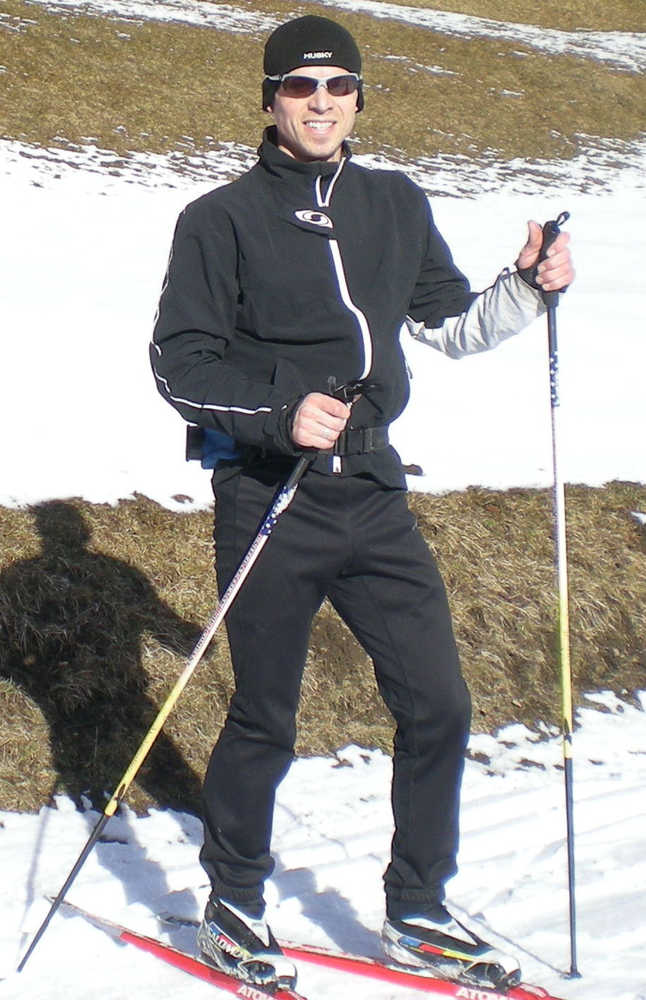The thrill of competition never gets old for many athletes, and for Soldotna’s Andy Liebner, the push to prove himself against some of the world’s best cross-country skiers has been a lifelong objective.
But for now, he will be facing the challenges of being a coach, rather than an athlete.
The 2001 Soldotna High School graduate is currently in Sochi, Russia, where he is preparing to execute his duties as head coach of the Peruvian cross-country ski team for the Winter Olympics.
It’s a long ways away from his hometown of Soldotna, where he made his name as the first runner from the Kenai Peninsula to win the Class 4A boys state cross-country running championship in 2000. Liebner also became the first cross-country skier from the Peninsula to win the Besh Cup.
This year, Peru only features one cross-country skier, and his name is Roberto Carcelen, a 43-year-old athlete whose career mirrors Liebner’s in many ways, the most obvious being that both have achieved big goals on the international level after growing up in small towns.
However, unlike Liebner, Carcelen took up the sport at a late age on a competitive level at 36. In professional skiing today, that’s often considered retirement.
“The message I want to put out there to the younger generation is that, even though you may feel the world is so far away and you may feel stuck in a small town, you can achieve anything and reach any level of success if you have the passion, drive, and communication skills amongst other things,” Liebner wrote in a recent email. “Everyone is just as connected to the planet as anyone else. Live on!”
Carcelen was the flag bearer for Peru at the most recent Winter Games in Vancouver, B.C., in 2010, leading his nation into the Olympic stadium for the opening ceremonies. It was the first time Peru brought any athletes to a Winter Olympics, and Carcelen led the way, accompanied by two other athletes — a pair of teenage alpine skiers.
“My impression of the message he’s brought, is that we’ll see more participants for these small countries that don’t have Winter Olympians,” Liebner said in a recent Skype interview. “We could go through a campaign for the next four years, you know, get the message out, get people to get out and show you can do it.”
Carcelen, who was born and raised in Lima, Peru, enjoyed a life as a professional surfer, and he owned an online business named Inca Runners, which gives people the opportunity to run the Inca Trail.
After moving to the U.S. at 32 years old, the skills and traits he picked up from surfing and running served him well when he picked up Nordic skiing.
In 2010, Carcelen finished 94th in the men’s 15-kilometer freestyle event at the Vancouver Olympics. After he finished, he never believed he’d be back again four years later in Sochi.
“I wasn’t planning on Sochi,” Carcelen said. “When Vancouver ended, I decided no more racing at that level. So I took a year off.”
But after Carcelen started racing again, he began accumulating points in qualifying races around the U.S., and he realized he could try the Olympic experience again.
“We were trying to find someone to replace me and go to the Olympics,” Carcelen said with a laugh. “We were trying to keep going, and now I say this will be it.”
However, Carcelen — a contractor for Microsoft who currently resides in Seattle — suffered a few broken ribs in a ski accident just over two weeks ago and that has hindered his late training schedule.
But, even with his injuries, Carcelen still plans on competing.
“It might be a long race for me, painful, but I plan on finishing,” he said. “I don’t drop all the people behind me. People are inspired, so the worst thing I can do is quit.
“I just need to figure out how to finish. I’m very worried about how to manage the race.”
That’s where Liebner comes in.
The two met at the 2009 World Skiing Championships in Liberec, Czech Republic, where Liebner helped Carcelen out by providing waxing assistance. Since that connection, Liebner has been doing much of his coaching from a distance, using Skype and email to connect. Liebner sends Carcelen a weekly training schedule on an Excel spreadsheet.
Liebner and Carcelen recently finished off their training regimen in the small town of Seefeld, Austria, before heading off to Sochi on Tuesday. Seefeld is located about 10 miles from Innsbruck, which hosted the 1964 and 1976 Winter Olympics.
“Andy is a solid coach, with good principles,” Carcelen said. “He has a good knowledge of the sport, and we became good friends.”
Liebner brought a vast well of experience to help guide Carcelen, including competing in biathlon events in Europe, a journey that Liebner documents in his book, “Wild Shot.” Biathlon combines cross-country skiing and target shooting into one event.
Additionally, two years ago, Liebner bought a large golf club shaft manufacturing plant and transported the machines from San Diego to Cheboygan, Mich. There, Liebner has re-engineered the machinery to create five new machines to produce some of the world’s lightest ski poles, under the name United States Ski Pole Company.
That knowledge of the details of the sport have aided Carcelen.
“We can all improve on some aspect of our lives and I enjoy coaching Roberto because he chose to pursue the Olympic dream and I felt qualified to support that goal,” Liebner said in the email.
Liebner has not strayed from his own fitness either. Last October, he finished 10th overall at the Detroit Marathon.
“My message is, you can come from a small town far away in Alaska, and do what I’ve done,” Liebner said. “I want my community to be proud of something I’ve done.”
The men’s 15-kilometer classic event that Carcelen will compete in is scheduled for Feb. 14 at 2 p.m. (1 a.m. AST).

